At ECP we believe in:
- Having a growth mindset
- Inquiry based learning
- Student and teacher collaboration
- Using the IB approaches to teaching and learning
- International-mindedness
The English College is special. Our focus is on how we learn more than what we learn.
We are a community of lifelong learners who work collaboratively to not only master the curriculum but also to develop critical thinking skills and consider multiple perspectives. We aim to nurture our curiosity, engage with enthusiasm and reflect on what we learn so that we may develop our fullest potential.
Meet our Experts
Heads of Faculty
- Read MoreGail ReardonAcademic Counsellor; Timetable Coordinator; Mathematics
Gail Reardon
The beauty of mathematics only shows itself to more patient followers. - Maryam Mirzakhani
- Read MoreStephen ElderHead of English Faculty
Stephen Elder
To adapt the words of C.L.R.James: The study of language and literature has “ a technical foundation. To enjoy it does not require technical knowledge, but analysis that is not technically based is mere impressionism.”
- Read MoreDr. Josef ŠvédaHead of Czech Faculty
Dr. Josef Švéda
"Let the main object... to seek and to find a method of instruction, by which teachers may teach less, but learners learn more." (Jan Amos Comenius)
- Read MoreGareth PughHead of German
Gareth Pugh
Wittgenstein said: ‘The limits of my language are the limits of my world.’ ECP’s MFL department seeks to push beyond those limits, thereby creating better communication between people.
- Read MoreJean KerrBiology; Science
Jean Kerr
“The scientist is not a person who gives the right answers, he's one who asks the right questions.” - Claude Levi-Strauss
- Read MoreTerri CollierHead of Humanities, Head of Psychology, Head of TOK
Terri Collier
The study of humanity itself, through the lenses of philosophy, history, geography and the social sciences, will open your eyes to the world you live in, and lay the foundation of the world you hope to create.
- Read MoreKaty MacLeodHead of Arts Faculty
Katy MacLeod
The Arts in all their forms serve a vital role both for the good of the individual and also for society: “Art asks us to think differently, see differently, hear differently, and ultimately to act differently, which is why art has moral force.” (Jeanette Winterson).
See Our Faculties
Teaching & Learning Team
- Read MoreDaniel IbbitsonTeaching & Learning Manager; Head of Computer Sciences
Daniel Ibbitson
My philosophy to learning and teaching lies within that of the International Baccalaureate’s mission statement: creating independent, critically reflective, life long, 21st century learners.
Examples of our practice:
- Consulting students on what types of feedback help them learn best
- The creation of a Teaching and Learning strategy to aid teachers in
sharing best practice through collaboration - Metacognitive activities that help students explore how they think rather
than recite rote memory content - Enriching lessons that consider our local and global contexts
Academic Programme
The English College prides itself on offering an education to help students develop into well-rounded individuals, capable of adapting to life after school and going on to have successful and happy lives.
We were the first school in Prague to offer both the Czech Maturita and the IB Diploma, and we have a proven track record of helping students to excel in both these qualifications.
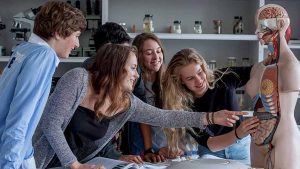
Teachers at the school are mostly from a British background, and are all trained to help students achieve outstanding academic results as well as enable them to develop all the traits of the IB learner profile. In addition we make sure that all our students are developing excellent English and that they are using this in all their lessons under the guidance of teachers who are native English speakers.
We also understand that it is essential that students retain both their academic Czech as well as their Czech culture, and believe our Czech department to be unparalleled in Prague, staffed by six native speakers with a wide range of experience in delivering Czech to native and non-native speakers. The department teaches both Czech language and literature, so all students receive an education in the subject that is relevant to their needs.
Years 1 – 4
Students in Years 1-4 follow a curriculum designed to develop the knowledge and skills required to succeed in the IB Diploma, providing them with a challenging, diverse and stimulating education. In particular we emphasise:
- The development of oral and practical skills
- An investigative approach to learning
- The use of initiative to solve problems
- Digital literacy and the use of technology to enhance learning
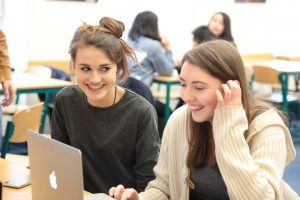
Our curriculum meets the requirements of the Czech Ministry of Education, integrating it with subject knowledge traditionally taught in UK independent schools. At the end of Year 4 students take a range of examinations, including Common European Framework language exams and our own internal examinations.
We have developed a new pre-IB programme for Years 3 and 4, focused specifically on developing the skills and knowledge required to succeed at IB Diploma level and beyond. This has replaced the IGCSE syllabi in most subjects, with external exams being retained in Mathematics, English and Modern Foreign Languages. All other subjects are assessed internally. We started teaching the new pre-IB course in September 2020.
Years 5 – 6 (The IB Diploma)
The IB Diploma gives access to universities worldwide. The Diploma Programme is a rigorous school leaving qualification which is highly respected internationally. Universities throughout the world appreciate the fact that IB students are more likely than their peers to complete undergraduate degrees and to go on to graduate positions in the workplace. Research also shows that IB graduates are more likely to engage more actively in various aspects of university life such as volunteering for community service, completing internships, leading student activities, and undertaking research. This is because IB students follow a curriculum that is both broad and deep, and they are encouraged to think independently and to take an active role in their own learning. They are also encouraged to be internationally minded and to act locally on community issues. More than 4000 schools worldwide teach IB programmes, teaching over a million students. All our Year 6 students are entered for the Diploma.
The English College is unusual in Prague in that we also prepare students for the Czech State Maturita examination alongside the IB Diploma; this allows those students who take this option the choice of universities in the Czech Republic as well as worldwide. Increasingly we are seeing our students study in a broader range of locations, and our key priority is to enable our students to compete successfully for places at the top universities in the world.

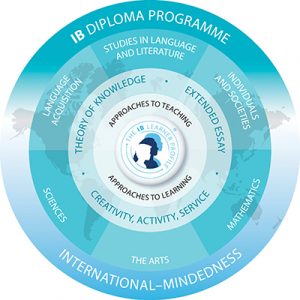
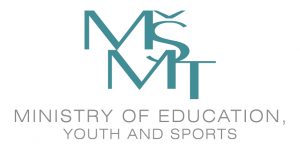

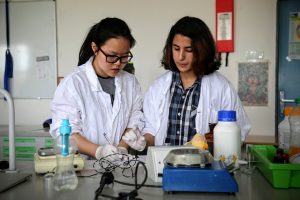
The Czech Maturita
Students at the English College may study for the Maturita as part of their IB studies; the qualification is awarded if a student a) passes the IB Diploma and b) passes the examinations in Czech Language and Literature set by CERMAT and c) has a qualification in a modern language other than Czech and English at B1 or above. As a general rule, those on the IB and Maturita programme should study Czech at Higher or Standard Level for IB.
All students follow the same programme of study in Years 1 to 4, with optional subjects chosen in Years 2 , 3 and 4. In Years 5 and 6 students get to choose between the IB and Maturita programme and IB-only programme. All of our Czech and Czech-speaking students are offered the Maturita. These students only need to take the Czech component of the Maturita exam in order to be awarded the Maturita qualification in full. (This is possible through an exemption awarded by taking and passing the IB.) Additionally, many of our Czech students on the IB and Maturita programme leave with the bilingual IB Diploma, having achieved equal levels of English and Czech and as such, they are equipped to choose from universities at home and around the globe. Because the government subsidises Maturita tuition, those on the IB and Maturita programme benefit from slightly reduced fees in Years 5 and 6.
The Maturita exam (Czech secondary school-leaving exam) consists of a common and a ‘profile’ part. The exam for the common part is in the form of a didactic test. Exams for the profile part are in the form of written work and an oral exam before the Maturita exam committee (more here). You can find the evaluation criteria here. The school’s reading list for the Maturita oral exam is here.
What our students say
- Read MoreAdéla HniličkováYear 3 Student
Adéla Hniličková
It might seem like any other school, but it’s exceptionality lies within the close relationships between us and the teachers. They are always there to help and support us.
- Read MoreEmma HorákováYear 3 Student
Emma Horáková
What I appreciate about The English College the most is it's ability to achieve an equilibrium in matters that other schools might find hard to balance. The coursework is just challenging enough to force me to push my limits, but it still allows me to have time to pursue my passions outside of school. Likewise, while the teachers and students maintain a professional and respectful relationship, the pupils always feel like they can talk to the teachers about anything and that their voices are heard.
- Read MoreFred ByrneYear 5 student, Student Council President
Fred Byrne
In an era of fake news and anti-intellectualism, the English College righteously values critical thinking over rote learning. Its reputation of professionalism and quality academics is well-earned.
All students at ECP take brief, online skills assessments provided by the University of Durham. Our Tutors use this information, alongside entrance exam results, previous academic performance, guidance from subject teachers, and their own professional judgement, to form a broad minimum expectation of their tutees’ academic progress. We track attainment against this baseline, intervening where students appear to be performing below expectation.This is a holistic system, considering both academic and pastoral factors, and placing the students’ individual needs at the heart of the process as we seek to help each student fulfil their academic potential.
The Learning Support Department works not only with students with Specific Learning Difficulties, but also offers general learning support to all students at the English College. The Head of Learning Support works closely with all staff and parents to identify and assist such students. The level of support ranges from individual one-to-one lessons, to group sessions or in-class support, either on a regular or occasional basis. The aim of the Learning Support Department is to create a level playing field for all students allowing them to achieve their full potential regardless of their difficulties.
Project TEMPLATES II – ENGLISH COLLEGE CZ.02.3.68 / 0.0 / 0.0 / 18_066 / 00166 09
The aim of the project, which is co-financed by the European Union, is to increase and improve the quality of teaching at The English College in Prague Anglické gymnázium, o.p.s .. Total amount of support: CZK 1,217,822.00
EUROPEAN UNION European Structural and Investment Funds OP Research, Development and Education and the Ministry of Education, Youth and Sports
Inclusion Initiative
Name of the project: Podpora inkluze na Anglickém gymnáziu
Registration number of the project: CZ.07.4.68/0.0/0.0/17_045/0000811
This project focuses on the following areas: staff support, direct support for children with a native language other than [Czech] and their parents/legal representatives, project teaching, community activities and the support of an inclusive school environment.
